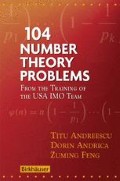Abstract
1.
-
Prove that the sum of the squares of 3, 4, 5, or 6 consecutive integers is not a perfect square.
-
Give an example of 11 consecutive positive integers the sum of whose squares is a perfect square.
Access this chapter
Tax calculation will be finalised at checkout
Purchases are for personal use only
Preview
Unable to display preview. Download preview PDF.
Rights and permissions
Copyright information
© 2007 Birkhäuser Boston
About this chapter
Cite this chapter
(2007). Advanced Problems. In: 104 Number Theory Problems. Birkhäuser Boston. https://doi.org/10.1007/978-0-8176-4561-8_3
Download citation
DOI: https://doi.org/10.1007/978-0-8176-4561-8_3
Publisher Name: Birkhäuser Boston
Print ISBN: 978-0-8176-4527-4
Online ISBN: 978-0-8176-4561-8
eBook Packages: Mathematics and StatisticsMathematics and Statistics (R0)

